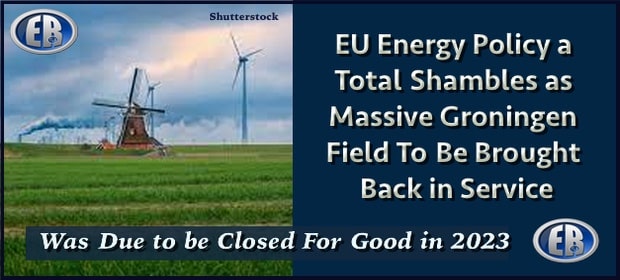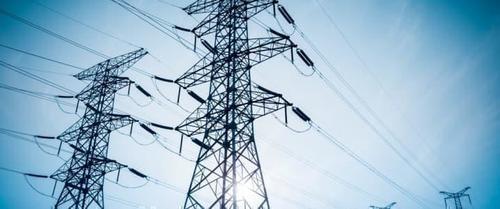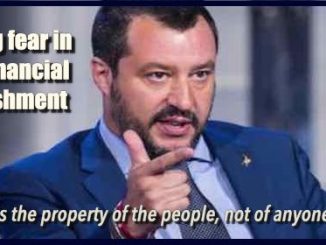
ER Editor: So is Russia withholding gas – because it now CAN? Because Nordstream 2 is not getting timely permission to start from Germany (the decision isn’t due to even be TAKEN until January 2023 despite the construction project being finished this month)? Because EU policies towards lame renewables have left it vulnerable in the current situation, precisely where Russia can now step in? As Cyril Widdershoven notes, the EU is responsible for its own energy mess. And should get a realistic attitude to the traditional forms of energy like gas and oil.
The Groningen field in the Netherlands was due to be closed in 2023 – why? Now it is being offered as a much-needed stop-gap by the Dutch government.
The Groningen field was, according to Wikipedia, ‘discovered in 1959, [and] is the largest natural gas field in Europe and the tenth-largest in the world’.
The EU couldn’t organize a pi**-up in a brewery, pardon our French.
********
The Harsh Truth Behind Europe’s Energy Crisis
Authored by By Cyril Widdershoven via OilPrice.com
Europe’s energy crunch is continuing, as gas storage volumes have shrunk to 10-year lows. A possible harsh winter could lead to severe energy shortages and possible shutdowns of large parts of the economy.
While the main discussion is currently focused on the potential role of Russia in the energy crisis, a new narrative could soon make the headlines. In a surprise move, the Dutch government has indicated that in a severe supply crunch situation, the Groningen gas field, Europe’s largest onshore gas field, could partially and temporarily be reopened. It seems that the term Dutch Disease could get a new meaning, from being the paradox of a rentier state suffering from plentiful resources to a show of Europe’s lack of realism when it comes to energy transition risks and current market powers. Dutch Minister Stef Blok has indicated that he is considering the potential reopening of the Groningen field, in particular five wells, especially the one at Slochteren, as indicated by Johan Attema, director of the Nederlandse Aardolie Maatschappij (NAM), the operator of the Groningen field. The reopening of the field, even in the case of an emergency or an energy crisis, is politically controversial.
Until recently, the plan was that Groningen would be closed completely by 2023, ending the large-scale gas production and export by the Netherlands with a bang. (ER: WHY?)
The Dutch media is speculating that minister Blok will be asking for a possible reopening of the Groningen field, a decision that must be made before October 1. If the Minister decides to change the current shutdown plans, the whole Groningen debacle, as some see it, will be prolonged. It is clear, looking at the current deplorable situation of the European energy sector, that Groningen is still needed. The ongoing energy crunch could have grave consequences for the economies and wellbeing of EU member states, changing the narratives in Brussels and the respective European capitals.
The lack of supply of natural gas by Russia (or the political will to supply more), the difficulty of ramping up Norwegian gas or other gas imports quickly, is jeopardizing Europe’s energy situation. At the same time, a possible shutdown of several electricity-intensive industries in Europe, such as fertilizers, chemicals, and steel/aluminum production is on the table.
Political leaders will have to face the direct implications of higher energy bills or possible energy deficits for consumers and the industry. Both could lead to protests or political landslides during upcoming elections. Threats of an energy crisis are being discussed widely, but no real solutions except lower taxes are available. Due to higher energy costs, a possible record price level of $100 MMBtu or $250 per barrel of crude oil equivalent is very bad news for politicians, especially in the Netherlands, Germany, France, and the UK.
It remains unclear, however, whether European politicians are aware of the role that their own policies have played in creating this crisis. Even with the partial restart of the Groningen field, which could relieve some of the pain in Western Europe, there is a larger problem that must be addressed.
By opening up the gas market for liberalization, without giving the necessary tools to parties, and pushing for a spot market, instability was introduced into the system. Geopolitical powers are still at play, while utilities and European suppliers have seen little support from their governments.
At the same time, when oil price-indexed long-term contracts with Russia were thrown out of the window, many did not understand that this could mean handing over full market powers to NOCs, such as Gazprom. Putin has been celebrating, knowing that he has been handed the key to European markets, with the option of manipulating fundamentals and prices at the same time. In the meantime, Europe has failed to sufficiently diversify supply.
European leaders desperately need to reconsider their position towards Russian gas supplies and the future role of NordStream 2, which is still being threatened by US sanctions and Eastern European opposition.
It seems that Russia’s leader Vladimir Putin, however, is holding all the cards when it comes to natural gas in Europe. Without substantially more natural gas supply to Europe, consumers and industry may well be facing a winter of discontent. Europe’s gas supply diversification strategy has been a failure, not only due to EU tactics and regulations but also because of the ongoing one-sided emphasis on a rapid energy transition, hydrocarbon divestment, and full-scale investments in renewables, without realizing that the backbone of the European economic system is still hydrocarbon fueled.
The current situation shows one main fact of life, the success of the energy transition is not based on a one-sided approach. By relying too much on renewables, the market became destabilized, but politicians and others didn’t want to admit it. Destabilization could and should be prevented, by acknowledging the fact that for the foreseeable future hydrocarbons, including coal, will be playing a significant role in the European energy market.
At the same time, European politicians also should acknowledge that without hydrocarbons, not only does energy supply become threatened, but the hydrocarbon economy suffers. It is not yet fully understood by most, but without hydrocarbons, especially natural gas and oil, food and other primary sectors will be hit hard. The first shutdowns of fertilizer and steel companies have already been reported.
Brussels, London, Berlin, and even The Hague, should start to change their approach to energy and the economy of the future. Politicians should start to listen to market analysts that have been warning of a disruption in energy markets.
The European long-term energy strategy should acknowledge the position of hydrocarbons as a backbone while investing in renewable options at the same time. Investments in storage, diversified supply, and domestic production are crucial. Without these, supply giants such as Putin’s Russia are holding all the cards.
************
Source

••••
The Liberty Beacon Project is now expanding at a near exponential rate, and for this we are grateful and excited! But we must also be practical. For 7 years we have not asked for any donations, and have built this project with our own funds as we grew. We are now experiencing ever increasing growing pains due to the large number of websites and projects we represent. So we have just installed donation buttons on our websites and ask that you consider this when you visit them. Nothing is too small. We thank you for all your support and your considerations … (TLB)
••••
Comment Policy: As a privately owned web site, we reserve the right to remove comments that contain spam, advertising, vulgarity, threats of violence, racism, or personal/abusive attacks on other users. This also applies to trolling, the use of more than one alias, or just intentional mischief. Enforcement of this policy is at the discretion of this websites administrators. Repeat offenders may be blocked or permanently banned without prior warning.
••••
Disclaimer: TLB websites contain copyrighted material the use of which has not always been specifically authorized by the copyright owner. We are making such material available to our readers under the provisions of “fair use” in an effort to advance a better understanding of political, health, economic and social issues. The material on this site is distributed without profit to those who have expressed a prior interest in receiving it for research and educational purposes. If you wish to use copyrighted material for purposes other than “fair use” you must request permission from the copyright owner.
••••
Disclaimer: The information and opinions shared are for informational purposes only including, but not limited to, text, graphics, images and other material are not intended as medical advice or instruction. Nothing mentioned is intended to be a substitute for professional medical advice, diagnosis or treatment.






Interesting. It makes me wonder if they’ve used geoengineering techniques to create that, but maybe that’s a step too far. Thanks for the info.
Groningen has been plagued by Earthquakes over the years, this has been a long-standing political dossier.
https://groninger-bodem-beweging.nl/aardbevingen/
The Netherlands have themselves moved away from gas, electrical cooking has become mainstream.
Of course, the great reset apparently has been planned for a long time as well. I have no special insight whether the earthquakes have been politically misused to force closure of the gas fields in service of Klaus Schwab.